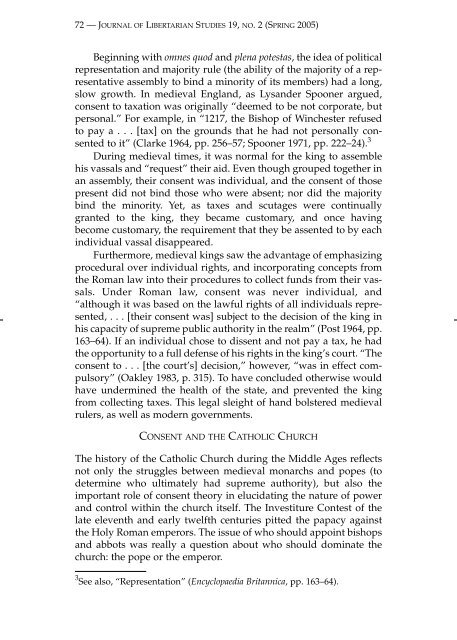Quod Omnes Tangit
Quod Omnes Tangit
Quod Omnes Tangit
You also want an ePaper? Increase the reach of your titles
YUMPU automatically turns print PDFs into web optimized ePapers that Google loves.
72 — JOURNAL OF LIBERTARIAN STUDIES 19, NO. 2 (SPRING 2005)<br />
Beginning with omnes quod and plena potestas, the idea of political<br />
representation and majority rule (the ability of the majority of a representative<br />
assembly to bind a minority of its members) had a long,<br />
slow growth. In medieval England, as Lysander Spooner argued,<br />
consent to taxation was originally “deemed to be not corporate, but<br />
personal.” For example, in “1217, the Bishop of Winchester refused<br />
to pay a . . . [tax] on the grounds that he had not personally consented<br />
to it” (Clarke 1964, pp. 256–57; Spooner 1971, pp. 222–24). 3<br />
During medieval times, it was normal for the king to assemble<br />
his vassals and “request” their aid. Even though grouped together in<br />
an assembly, their consent was individual, and the consent of those<br />
present did not bind those who were absent; nor did the majority<br />
bind the minority. Yet, as taxes and scutages were continually<br />
granted to the king, they became customary, and once having<br />
become customary, the requirement that they be assented to by each<br />
individual vassal disappeared.<br />
Furthermore, medieval kings saw the advantage of emphasizing<br />
procedural over individual rights, and incorporating concepts from<br />
the Roman law into their procedures to collect funds from their vassals.<br />
Under Roman law, consent was never individual, and<br />
“although it was based on the lawful rights of all individuals represented,<br />
. . . [their consent was] subject to the decision of the king in<br />
his capacity of supreme public authority in the realm” (Post 1964, pp.<br />
163–64). If an individual chose to dissent and not pay a tax, he had<br />
the opportunity to a full defense of his rights in the king’s court. “The<br />
consent to . . . [the court’s] decision,” however, “was in effect compulsory”<br />
(Oakley 1983, p. 315). To have concluded otherwise would<br />
have undermined the health of the state, and prevented the king<br />
from collecting taxes. This legal sleight of hand bolstered medieval<br />
rulers, as well as modern governments.<br />
CONSENT AND THE CATHOLIC CHURCH<br />
The history of the Catholic Church during the Middle Ages reflects<br />
not only the struggles between medieval monarchs and popes (to<br />
determine who ultimately had supreme authority), but also the<br />
important role of consent theory in elucidating the nature of power<br />
and control within the church itself. The Investiture Contest of the<br />
late eleventh and early twelfth centuries pitted the papacy against<br />
the Holy Roman emperors. The issue of who should appoint bishops<br />
and abbots was really a question about who should dominate the<br />
church: the pope or the emperor.<br />
3 See also, “Representation” (Encyclopaedia Britannica, pp. 163–64).
















